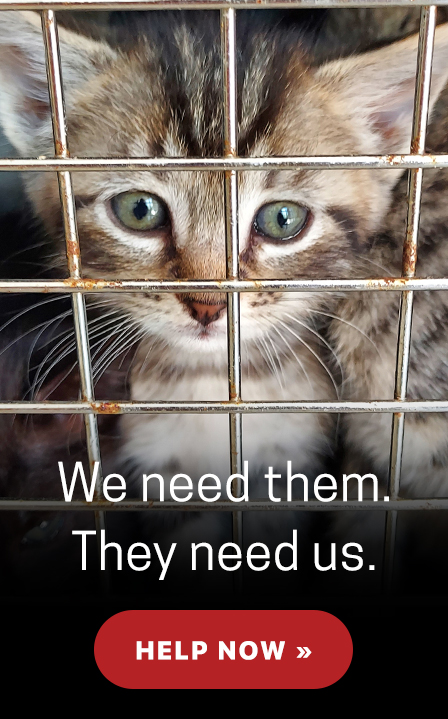Charles Dickens famously mused, ‘What greater gift than the love of a cat?’
We at American Humane fully agree. We founded Adopt-A-Cat Month® 47 years ago to encourage people to adopt cats from animal shelters, where there is the greatest need. We celebrate it each June – a month that also marks the height of “kitten season,” when large litters of kittens are born and often end up in animal shelters.
All cats deserve loving homes and pet parents who will guarantee they get the best possible care. By bringing home a new kitten and/or senior cat, you can be a hero AND find your new, purrrfect best friend.
The popular annual campaign is part of a larger effort by American Humane to help these beautiful animals and focus on the unique challenges and issues they face. Although cats have often been referred to as America’s “Most Popular Pet,” with an estimated 94 million living in 47 million U.S. households, they receive less veterinary care, have less research dedicated to their unique health/behavioral issues, are more likely to be feral, and are more likely to be euthanized in shelters than dogs.
In addition to raising awareness of the importance of adopting a shelter cat at this time, we will also be sharing Adopt-A-Cat Month® tips and content on our website and across our social media platforms throughout the month to ensure potential pet families are prepared for the joyful – and sometimes confusing – moments of adopting a cat.
TOP 10 CHECKLIST FOR ADOPTING A CAT
- If you’re thinking about adopting a cat, consider taking home two. Cats require exercise, mental stimulation and social interaction. Two cats can provide this for each other.
- Find a cat whose personality meshes with yours. Just as we each have our own personality, so do cats. In general, cats with long hair and round heads and bodies are more easygoing than lean cats with narrow heads and short hair, who are typically more active. Adoption counselors can offer advice to help you match the individual cat’s personality with your own.
- Pick out a veterinarian ahead of time and schedule a visit within the first few days following the adoption. You’ll want to take any medical records you received from the adoption center on your first visit. Due to their immaturity, kittens in particular should accompany you to make the appointment – even before the exam itself – so staff can pet the cat and the animal will have a positive association with the veterinarian’s office.
- Make sure everyone in the house is prepared to have a cat before your new pet comes home. Visiting the shelter, rescue group or animal control facility should be a family affair. When adopting a new cat with existing pets at home, discuss with the adoption facility how to make a proper introduction.
- Budget for the short- and long-term costs of a cat. Understand any pet is a responsibility and that there’s a cost associated with it. A cat adopted from a shelter is a bargain; many facilities will have already provided spaying or neutering, initial vaccines, and a microchip for permanent identification. Plus, shelters and rescue groups are there to offer guidance and assistance as you acclimate your new family member.
- Stock up on supplies before the cat arrives. Be prepared so your new cat can start feeling at home right away. Your cat will need a litter box, a good-quality cat litter, food and water bowls, food, scratching posts, safe and stimulating toys, a cushy bed, a brush for grooming, a toothbrush and nail clippers.
- Cat-proof your home. A new cat will quickly teach you not to leave things lying out. Food left on the kitchen counter will serve to teach your new friend to jump on counters for a possible lunch. Get rid of loose items your cat might chew on, watch to ensure the kitten isn’t chewing on electric cords, and pick up random items like paper clips (which kittens may swallow).
- Go slowly when introducing your cat to new friends and family. It can take several weeks for a cat to relax in a new environment. It’s a great idea to keep the new addition secluded in a single room (with a litter box, food and water, toys and the cat carrier left out and open with bedding inside) until the cat is used to the new surroundings; this is particularly important if you have other pets. If you’ve adopted a kitten, socialization is very important. But remember – take it slow.
- Be sure to include your new pet in your family’s emergency plan. You probably have a plan in place for getting your family to safety in case of an emergency. Adjust this plan to include your pets. Add phone numbers for your veterinarian and closest 24-hour animal hospital to your “in-case-of-emergency” call list and be sure to have a several-day supply of your pet’s food and medications on hand.
- If you’re considering giving a cat as a gift, make sure the recipient is an active participant in the adoption process. Though well-meaning, the surprise kitty gift doesn’t allow for a “get-to know-one-another” period. Remember, adopting a cat isn’t like purchasing a household appliance or a piece of jewelry – this is a real living, breathing, and emotional being.
What are you waiting for? Ride the wave and adopt a fabulous feline – or two – this Adopt-A-Cat Month®!


